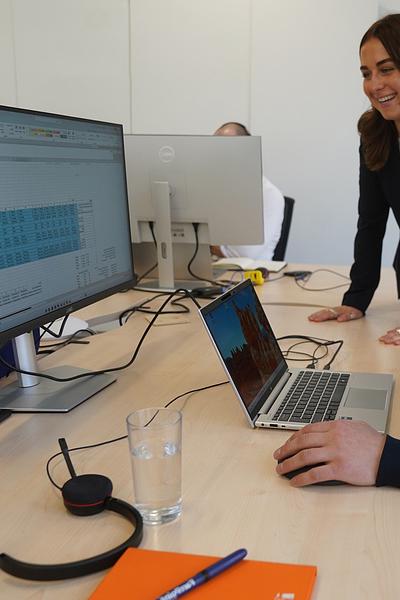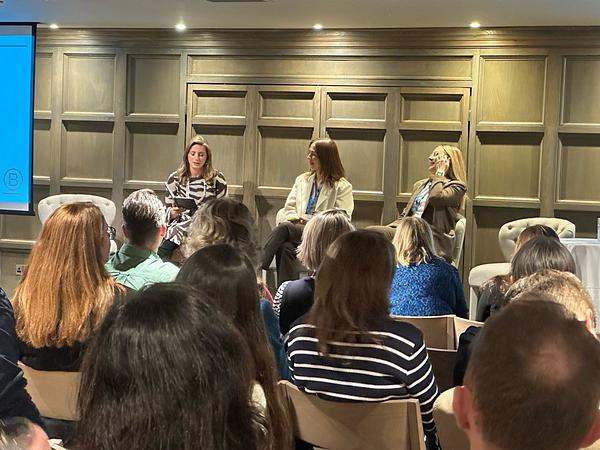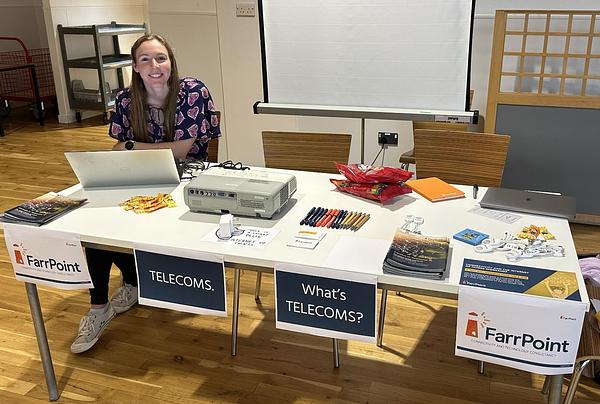
For years, economic models often overlooked the impact of policies on different genders, while telecom infrastructure was developed with little consideration for who might be excluded. We understand that it's not an issue that can be solved overnight, but it's about time we finally bridge that gap.
Kate Milne shares her perspective as a woman working in the field:

“Only about 30% of economists globally are women,” notes Kate, “and even fewer are in positions where they shape policy. That matters—because the types of questions we ask are shaped by the people asking them.”
(this will open in a new window)Kate’s interest in this imbalance led her to volunteer with (this will open in a new window)The Women in Economics Initiative, a global movement to encourage equal opportunity and diversity in this discipline. At FarrPoint, she’s bringing that perspective into our Environmental, Social, and Governance (ESG) practices, helping to ensure that our impact assessments account for more than just technical feasibility—they also consider the social aspect.
She recently spoke at Scotland’s first (this will open in a new window)BCORP Festival, where she talked about why it’s so important to create space for underrepresented voices in business. She shared how bringing diverse perspectives into decision-making leads to better, more thoughtful outcomes – not just for ESG goals, but for long-term business success. It’s about more than just a box-ticking exercise; it’s about building organisations that truly reflect and serve the communities they’re part of.
Kate presenting at the BCORP Festival in Edinburgh

Kate believes economic impact studies of digital technology and connectivity are key to showing how investments lead to real-life outcomes. But to be truly effective, they must look beyond basic economic figures and examine who benefits and who doesn’t. Adding a gender perspective helps reveal gaps in access, affordability, and digital skills that often disproportionately affect women and girls. By exposing these inequalities, such studies can guide more inclusive policies and investments, ensuring digital growth supports both economic progress and gender equality.

(this will open in a new window)Nikki approaches equality from a different but complementary angle, through data and geography. Working on projects that map digital connectivity across the UK and Canada, she has a unique perspective on how infrastructure decisions can impact project outcomes.
Nikki believes that increasing gender diversity in telecoms is essential. As a traditionally male-dominated industry, it still has a long way to go in encouraging more women and girls to enter the field. Last year Nikki went to the Orkney Science Festival to do just that - inspire more young people to get into telecommunications and data science. She emphasises that diverse perspectives bring fresh ideas and approaches, which are crucial for driving innovation and inclusion.
Nikki at the Orkney Science Festival, talking to people about telecoms as a discipline

One of the tools Nikki highlights is Geographic Information Systems (GIS), which can uncover real-world patterns of inequality by mapping and visualising data. By examining population data, for example, it becomes possible to identify how different factors affect specific groups. With these insights, the industry can begin to rethink how problems are addressed—ensuring that solutions are more inclusive and truly meet the needs of everyone.
Nikki recently attended a GIS conference, where she noted that just under 40% of the speakers were female. She commented,
“This is already a vast increase from 5-10 years ago, where on average, females would only make up around 20% of speakers. It is great to see a much more diverse group of people attending these conferences. However, there is still more that can be done.”
We’re seeing more women entering economics and tech roles, more conversations about inclusion, and more accountability from organisations. But structural biases persist, and progress isn’t automatic.
Both Nikki and Kate agree that while progress has been made, the pipeline for women in the field remains weak, with too many leaving along the way. They emphasise that culture, mentorship, and visibility are key to change. Creating environments where women feel seen, supported, and valued isn’t just a bonus – it’s essential for lasting, meaningful progress.
“We need more women contributing to technology,” says Nikki “Technology and connectivity can shape the future but only if everyone has the opportunity to make an impact.”
"At FarrPoint, we know that diverse teams lead to better decisions, whether in designing telecoms policy or shaping economic strategy. That’s why we’re investing in inclusive practices and amplifying the voices of people like Kate and Nikki. Why wouldn't we?", says Kristina Vard, FarrPoint's Head of Marketing.
By incorporating diverse perspectives into our consultancy work, FarrPoint enables clients to deliver more inclusive, resilient, and future-proof projects. Whether you're developing connectivity strategies or digital inclusion policies, our team brings both the technical expertise and the social insight needed to make a lasting impact. Get in touch to explore how we can support your goals.
Connectivity is important. It drives business and society, bringing communities and commerce together. That's why we use our insight and experience to connect people and business.